Air to air heatpumps are an increasingly popular technology for both heating and cooling homes. These systems work by extracting heat from the outdoor air during the winter months and using it to heat the home, and then reversing the process to provide cooling during the summer.
The benefits of air to air heat pumps are significant, not only do they provide a sustainable source of heating and cooling, but they are also energy efficient, cost-effective, and require minimal maintenance. Additionally, these heat pumps can be used in a variety of home settings, making them a highly versatile solution for homeowners who are looking to reduce their carbon footprint and enhance their overall comfort and wellness.
Overall, installing an air to air heatpump in your property is a smart investment that offers long-term savings while also contributing to a healthier planet
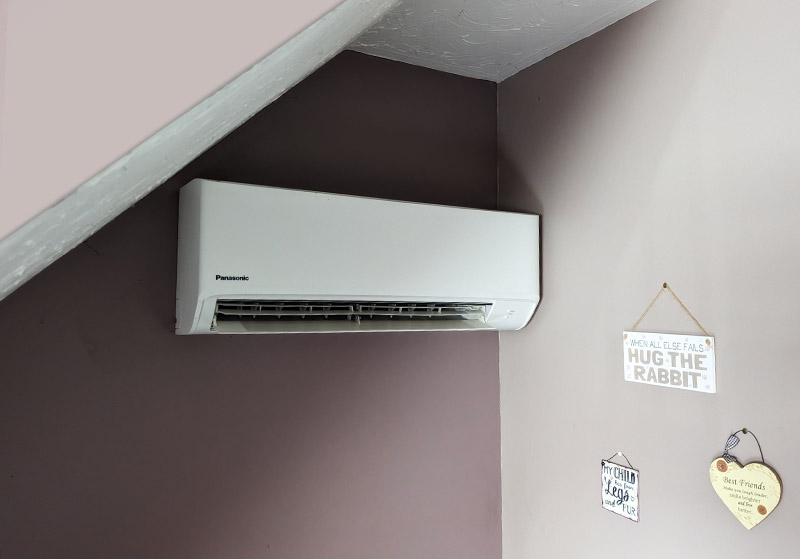
Air to air heatpumps offer superb energy efficiency which is a key reason why they are proving to be such a popular alternative to traditional systems.
They have a typical efficiency rating of 300%. The average home in the UK will use around 12,000 kWh per year for heating. A standard heat pump would provide the same level of heating with just 4,000 kWh.
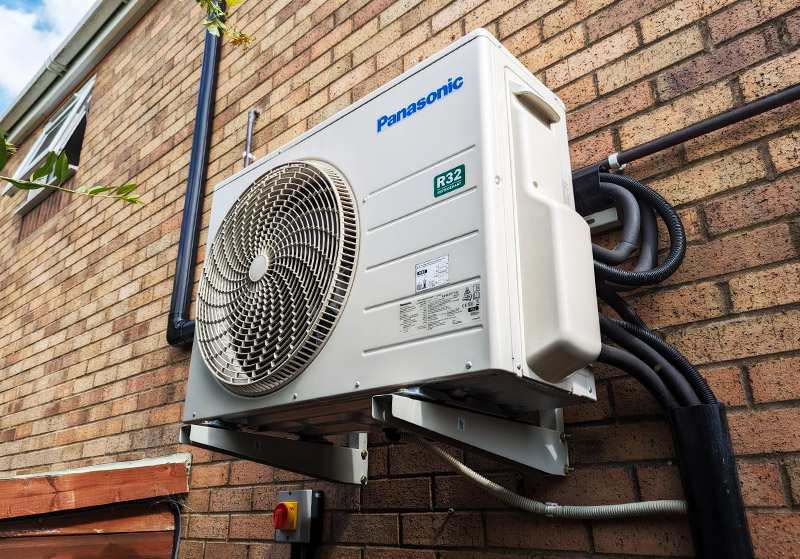
Air to air heat pumps use outdoor air to provide indoor heating or cooling. They are energy-efficient, lower carbon emissions, require lesser energy consumption to maintain indoor temperature and eliminate the need for separate heating and cooling systems. This reduces energy bills and conserves resources while having a minimal impact on the environment.
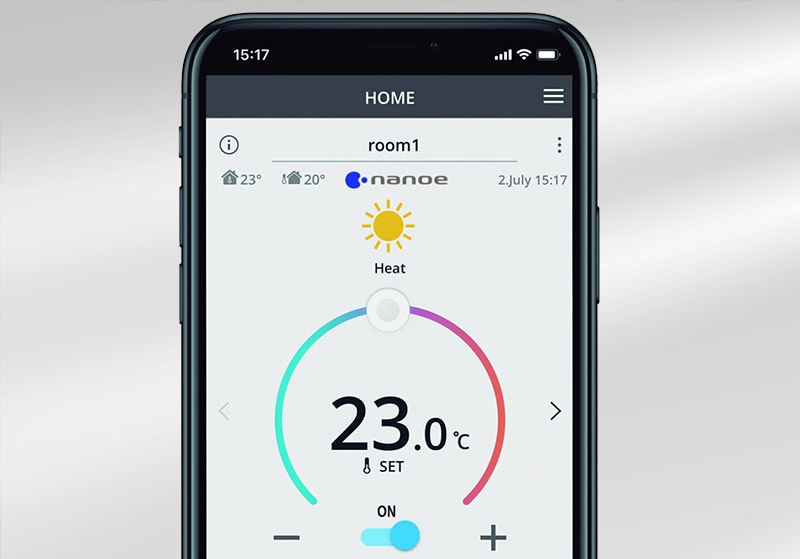
All of our systems can be controlled by remote control or by a supplier provided App so you can easily control and access all features of your systems remote control from anywhere and at anytime.
You can also monitor your air to air heat pump energy usage which will allow you the opportunity to learn how to reduce the operating cost even more.
The air to air heatpump represents a breakthrough in efficient heating technology, offering the dual advantage of also air conditioning your home.
Remarkably efficient, turning 1KW of energy input into 4KW output. They heat and cool with up to four times efficiency of other systems.
Say goodbye to radiators, unsightly pipes, or the need for underfloor heating, needed in other heating systems.
Expect to see a reduction in CO2 emissions by about 66% to 75% when compared to alternative heating or colling systems.
The unit is free from harmful fumes or chemicals, eliminating risks of possible fires or any kind of explosions.
These heat pumps have a lifespan of over 20 years, requiring only affordable annual servicing and light maintenance.
Our installed units operate at a barely audible level, with noise levels ranging between 20 and 30 dB, equivalent to a soft whisper.
Integrating this state-of-the-art heating and cooling system will enhance your property's resale value to prospective buyers.
Air to air heat pumps stand alone in offering a sustainable option for both heating and cooling throughout the year.
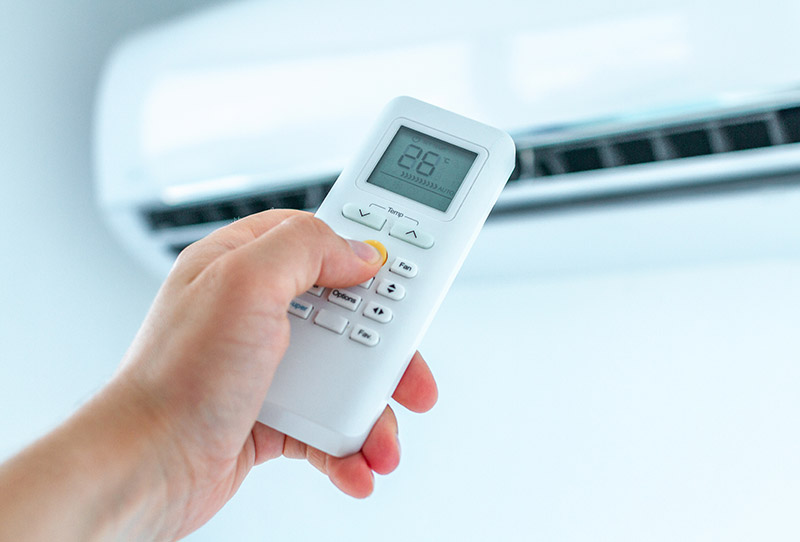
Warm air at the touch of a button
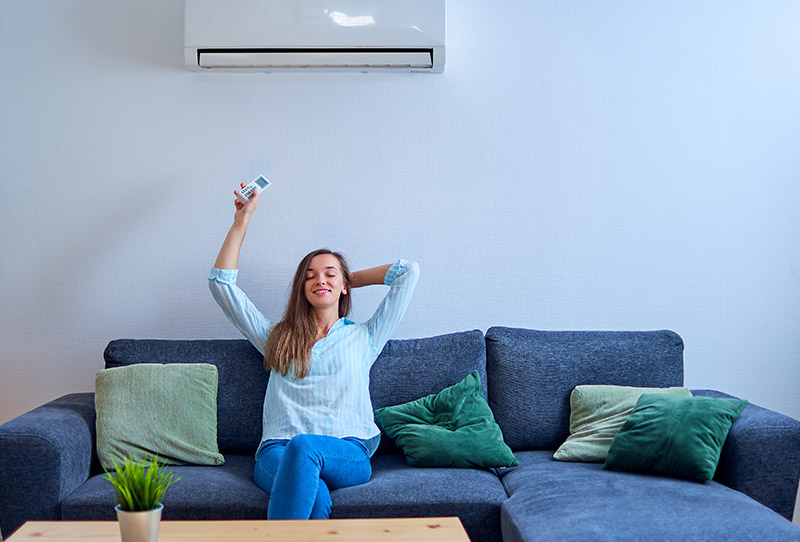
Cool air at the touch of a button
An air to air heat pump can be a great solution for many properties when it comes to heating and cooling. This type of system works by transferring heat from outside air to inside your property, rather than producing heat from scratch. It is very efficient and cost-effective, particularly in temperate climates like the UK. However, whether or not it is the right solution for your property, depends on a number of factors, such as the size and level of insulation of your property and your heating and cooling needs.
In general, larger properties will require multiple units to effectively heat and cool the space. It is always a good idea to consult with a professional HVAC technician to determine if this type of system is the right fit for your property. Our team will consider all of these factors in detail during a site survey.
There are various suitable locations to place an air to air heat pump in your home. Ideally, the air to air heat pump should be installed outside on a flat surface, which is close to the indoor unit to minimise the length of refrigerant piping. If you live in a cold climate area, ensure the heat pump is elevated on a stand to prevent snow or ice from building up on the unit. It should be in a location where it can access the supply and return air ductwork easily. Avoid placing the heat pump in high traffic areas or where it may be exposed to harsh weather conditions. Additionally, ensure the location allows for easy access to the unit for cleaning, maintenance, and repairs. A professional HVAC contractor can help you choose the best location for your heat pump. Our team will review all aspects in detail to determine the ideal solution for your particular situation during a site survey.
Air to air heating and cooling systems are unique as they provide you with both heating and air conditioning. The two are often combined into a single system that can be controlled through a thermostat. This allows you to easily switch between heating and cooling as needed, depending on the temperature outside and your comfort preferences. If you live in a region with extreme temperatures, both heating and air conditioning may be necessary to keep your home comfortable throughout the year. It is worth noting that while both heating and air conditioning units can be costly to install and maintain, they can also increase the value of your home and provide a more comfortable living environment.
One of the big advantages of air to air heatpumps is they do not require radiators or underfloor heating to heat your rooms. Air to air heat pumps use blowers or air ducting pipes to warm the air in the room.
Blowers are usually wall mounted quite high up in order to provide better circulation and to keep wall space free. Ducting systems are more commonly found in new build homes where the ducts are fitted within the ceiling cavities.
The size of your property and the number of rooms you need to heat and cool will determine the type of system that is best for you and the number of internal units and external heat capture units you will require. This will have an obvious impact on the overall cost. So the larger your property the bigger the cost will be for the products and installation.
Air to air heat pumps DO NOT heat your water, so you will require an additional system for this. There are several sustainable options for heating water, including electric, solar, and heat pump systems. The choice of system will depend on individual preferences, budget, and location. Electric systems are generally the most common and cost-effective option. Solar systems are becoming increasingly popular as a renewable energy source, while heat pumps can provide energy efficient hot water. It is important to consult with a professional to determine the most suitable system for your individual needs and to ensure proper installation and maintenance.
Air to air heat pumps are remarkably efficient to run and they can be quite cheap to install but this will depend on the size of your property and the number of rooms you need to heat and cool.
These heat pumps are far more efficient than other heating systems because they produce more heat than the electricity they use. A well functioning and well maintained heat pump will give out 3 to 4 units of heat for every unit of electricity consumed. So 1KW of electricity outputs 4KW’s worth of heating.
Air to air heat pumps are very low maintenance so an annual maintenance inspection should keep things running smoothly. All you have to do is occasionally clean out the filters in the internal units, which is a very simple process.
They also have a very long life span so you will have plenty of time to recoup your installation costs. You can expect an air to air heat pump system to last 20+ years.
Often the internal units containing the blowers are situated on the inside of the exterior wall that the external unit has been fitted to, to reduce the amount of internal pipework required. Our installers will ensure that they use the most efficient routes for all required pipework and they will confirm this with you before the installation takes place.
Internal units are also often placed high up to maximise wall space and for more efficient air circulation.
Our air to air heating and cooling systems also provide dehumidification. There are many advantages to this. Firstly, they can effectively lower the humidity levels within a given space, leading to a more comfortable and healthier living environment. High humidity levels can lead to the growth of mold and mildew, which can cause allergic reactions and other health problems. Additionally, high humidity levels can lead to damage to furniture and other household items. By removing excess moisture from the air, air conditioning units that also provide dehumidification can help prevent these issues. Secondly, these units can also improve indoor air quality by filtering out pollutants and allergens from the air. Finally, these systems can help reduce energy consumption by providing both cooling and dehumidification in one unit, thus reducing the need for multiple systems and saving on energy costs.
An air to air heat pump is a heating and cooling system that uses outdoor air to either warm or cool the indoor air. It transfers heat from the exterior to the interior of a building, creating a comfortable interior climate.
Air to air heat pumps offer energy efficiency, environmentally responsible heating and cooling, and reduced costs relative to other heating and cooling options. They also offer consistently comfortable indoor temperatures.
Air to air heatpumps have several advantages over other types of heat pumps, including:
1. Cost-effectiveness: Air to air heat pumps are generally more affordable to install and maintain compared to other types of heat pumps such as ground-source heat pumps.
2. Easy installation: These heat pumps are easy to install since they don’t need complicated ground excavations like the ground-source heat pumps or new pipework and radiators like air-to-water systems.
3. Versatility: Air to air heat pumps can be used for both heating and cooling purposes. They are the only type of heat pump that can effectively and efficiently do this.
4. Less space needed: Because they don’t use radiators they require less physical space in your home or property and are less obtrusive.
5. Effective in temperate climates: Air to air heat pumps work best in climates where there are no extremes of weather, so are ideal solutions for all over the United Kingdom.
6. Eco-friendliness: They are a more environmentally friendly option since they don’t burn fossil fuels.
Overall, the advantages of air to air heat pumps make them a great choice for homeowners or property owners looking for a cost-effective, efficient, and environmentally friendly way of heating or cooling their property.
There are several types of heat pumps for domestic heating. The most common types are air source heat pumps, ground-source (geothermal) heat pumps, water-source heat pumps.
Air source heat pumps (air-to-air or air-to-water) extract heat from the outside air and transfer it into the home. They work best in mild climates.
Ground-source heat pumps extract heat from the ground through a series of pipes that are buried in the earth. They are more expensive to install but can be slightly more efficient than air-source heat pumps.
Water-source heat pumps extract heat from a nearby water source, such as a pond or lake. They are very efficient but require access to a suitable water source.
Air to air heat pumps are what we specialise in. They are very often the most cost-effective systems as they don’t require radiators or underfloor heating. Sustainable heating and cooling is circulated around a room using an internal unit. Air to air heat pumps also come with the added advantage of providing your home with sustainable cooling.
Air to air heat pumps can be a cost-effective and energy-efficient way to heat and cool your home. They work by transferring heat between the indoors and outdoors, using electricity to power the process.
The benefits of air to air heat pumps include lower energy bills, improved indoor air quality, and reduced carbon emissions. They also provide year-round heating and cooling, eliminating the need for separate heating and cooling systems.
However, the effectiveness of air to air heat pumps can be impacted by the standard and level of insulation. If your home is poorly insulated our surveyor will take this into account in any recommendations. Although, the upfront cost of installation can be higher than, say the traditional gas boiler, the long-term running cost savings can quickly pay for the higher up-front cost.
Overall, air-to-air heat pumps can be a worthwhile investment for homeowners looking to save money on their energy bills and reduce their environmental impact, as long as they are properly sized and installed by a qualified technician.
Air to air heat pumps only require maintenance once a year to ensure that they are operating at peak efficiency. Occasional cleaning and filter replacement are also important to maintain performance. All you have to do is occasionally clean or replace the filters in the internal units, which is a very simple process.
Apart from the above, there is minimal maintenance required for these units. This will be explained on installation.
Heat pumps are remarkably efficient to run and they can be quite cheap to install but this will depend on the size of your property and the number of rooms you need to heat and cool.
Heat pumps are far more efficient than other heating systems because they produce more heat than the electricity they use. A well-functioning and well-maintained heat pump will give out 3 to 4 units of heat for every unit of electricity consumed. So 1KW of electricity can output 4KW’s worth of heating.
Heat pumps are very low maintenance so an annual maintenance inspection should keep things running smoothly.
They also have a very long life span so you will have plenty of time to recoup your installation costs. You can expect an air to air heat pump system to last 20+ years.
Air to air heat pumps DO NOT heat your water, so you will require an additional system for this. There are several sustainable options for heating water, including electric, solar, and heat pump systems. The choice of system will depend on individual preferences, budget, and location. Electric systems are generally the most common and cost-effective option. Solar systems are becoming increasingly popular as a renewable energy source, while heat pumps can provide energy efficient hot water. It is important to consult with a professional to determine the most suitable system for your individual needs and to ensure proper installation and maintenance.
Air to air heat pumps are often used as an energy-efficient alternative to traditional heating and cooling systems. However, their effectiveness can be impacted by extreme temperatures, especially when it drops below freezing. In general, air to air heat pumps still work well when the outside temperature is below freezing but may not be as efficient, especially when it is well below freezing.
This is because heat pumps extract warmth from the surrounding air and transfer it indoors. When the outside air is cold, there is less heat for the heat pump to extract. When it reaches extremely low temperatures like below freezing, heat pumps have to work harder to heat up the air from the outside. Although the system will have to work harder it will still be fully functional.
To combat this issue, some newer models of air to air heat pumps are designed with built-in defrost cycles that remove ice build-up on the outdoor unit, allowing the system to continue working effectively in cold temperatures. Proper maintenance and regular service can ensure that the heat pump continues to operate smoothly even in extreme weather conditions.
An air to air heatpump can make some noise, but the level of noise largely depends on the model and size of the unit. Some heat pumps are designed to be quieter than others by incorporating features such as variable speed fans, sound-dampening insulation, and anti-vibration systems. Additionally, the location of the unit can also affect the amount of noise heard inside the home. All of our systems are very quiet to run. We primarily use Daiken and Panasonic systems.
If you have any questions or if you would like to arrange a free, no obligation estimate, please send us a message and we'll get back to you as soon as we can.
Copyright © 2024 WBH Industries Group. Air to air heat pumps by WarmVent. All Rights Reserved